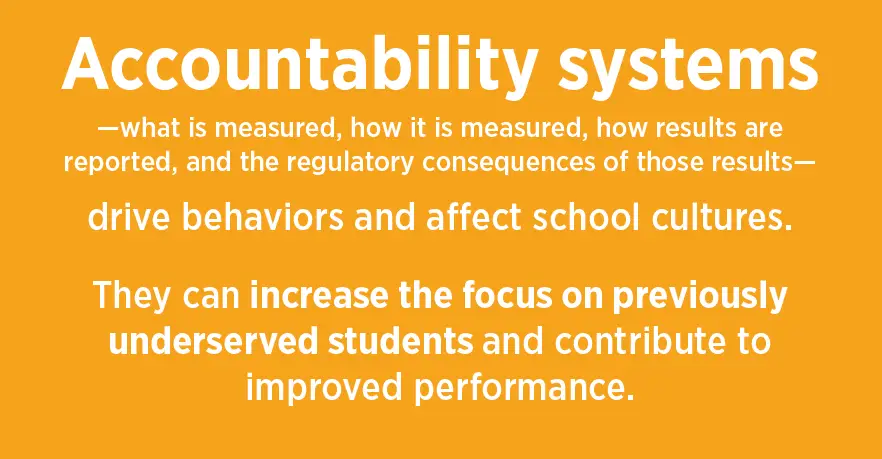School accountability matters. In a country founded on the dream that any child can grow up to be whatever she wants to be, accountability provides a measuring stick to judge how well schools are doing at giving each child—and every type of child—a fair shot at a good future. In a fast-changing world where the majority of today’s elementary school children will hold jobs that haven’t even been invented yet, accountability helps parents judge whether schools are equipping their students for the demands of lifelong learning and dynamic careers. In an education system as decentralized and fragmented as ours, accountability provides critical insights for communities into the quality of their schools and for parents into the options available to their children. And for state education leaders and policymakers, accountability highlights excellence, targets intervention needs, and drives improvement. At least, that’s what accountability should do.

But states are struggling to design systems that meet their needs, much less their aspirations. With ESEA waiver extensions due for resubmission, states have an opportunity to think deeply and creatively about the next generation of accountability, and in the process, to build models that better meet their goals.
With decades of accountability experience behind us, states have a lot to think about. Under NCLB’s accountability system, the public was able, for the first time, to see the socioeconomic and racial inequities within schools and districts. But while achievement gaps were broadly exposed, NCLB’s approach to measuring student proficiency was flawed. Each state had its own definition of “proficient” and all of the incentives aligned to drive these targets lower and lower.
The new standards and assessments start correcting these problems. They use “college readiness” as the high school proficiency target—and map back from there to define “on track” at each grade level. And with multi-step, open-ended, thought-provoking items, the new assessments will encourage instructional practices very different from those required to perform well on states’ old “fill-in-the-bubble” tests. Yet while all of this represents clear improvement, it still leaves other complicated lessons from past accountability systems’ successes and failures to reflect on.
Accountability systems—what is measured, how it is measured, how results are reported, and the regulatory consequences of those results—drive behaviors and affect school cultures. They can increase the focus on previously underserved students and contribute to improved performance. But they can also foster cultures of test preparation and a narrowing of what’s taught in schools. And though ESEA flexibility has freed states from the NCLB straightjacket, so far, few states have taken advantage of the freedom.
So, with a more sharply focused rearview mirror, new instrumentation on the dashboard, and waiver extensions offering alternative routes, it seemed a propitious time to step back and reflect on the journey. It was in this spirit of learning and improvement that a bipartisan group of educators, scholars, and policy experts got together in June 2014, under the auspices of the Center on Reinventing Public Education and the Thomas B. Fordham Institute, to review lessons learned, discuss what has worked and what has not, and begin a discussion of where to go next. A full list of the group’s common principles can be found here. A more complete summary of the discussion that produced the principles can be found here. As one expert put it, “We cannot design a perfect system. [But] we can [design] one that improves over time.” That seems an appropriately ambitious goal for today’s state accountability systems.
Joanne Weiss, former chief of staff to U.S. Secretary of Education Arne Duncan and director of the federal Race to the Top program, is an independent consultant to organizations on education programs, technologies, and policy.
On Monday’s blog: Sandy Kress, former senior advisor on education to President George W. Bush and attorney at Akin Gump Strauss Hauer & Feld, “Fix the Problems, But Don’t Retreat on Accountability”
Join the conversation on Twitter: #TheNewAccountability




